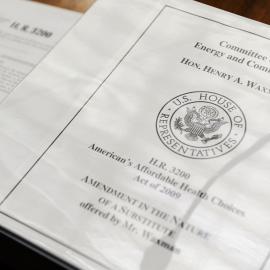Condoleezza Rice ("The New American Realism," July/August 2008) evokes a certain sympathy but also substantial disappointment with her account of the accomplishments of the Bush administration over the last eight years. Her argument is undeniably poignant, especially for its hyperbole and obfuscation. It is embarrassing that she should offer so self-serving an account of the pretended achievements of the Bush administration, given that its foreign policy disasters are well known.
Secretary Rice exaggerates the democratization process occurring in the world today. Although her praise of developments in central and eastern Europe is legitimate, she finds it impossible to acknowledge the simple fact that a substantial number of states in Africa, Asia, and Latin America today are either autocratic or oligarchic. Ignoring the real transformation in the world today, Rice is blind to the economic, social, and political challenges that confront even stable and prosperous societies. As for the impoverished parts of the planet, where billions of people live, she shows no appreciation of the devastating effects of today's large and unprecedented increases in food and energy costs.
Her understanding of the character of today's international order is also seriously deficient. Although institutional innovation, such as that provided when U.S. power was paramount, for example under Franklin Roosevelt and Harry Truman, may no longer be possible, major change is still conceivable -- but only if American leaders of stature and skill are prepared to take bold diplomatic initiatives. The need to negotiate not only with friends and allies but also with players more critical of the United States and disinclined to accept its vision of the world is the requirement of our day and yet has been scarcely attempted.
There is a disconcerting innocence in Rice's essay. Her failure to consider the role of religion in creating new fissures in the world -- a world more fractured than she is prepared to admit -- is part of her larger neglect of history. The world may have been changed on 9/11, but it was not created on that day. Rice's call for a "new American realism" is a partisan political plea for the policies of a flawed administration incapable of appreciating the Herculean efforts required in the past to gain the support of domestic and foreign public opinion for major policy innovations. Judicious weighing of the recent administration's performance cannot be expected of the United States' departing secretary of state. It is for a new, less defensive generation to take up this challenge.
You are reading a free article.
Subscribe to Foreign Affairs to get unlimited access.
- Paywall-free reading of new articles and a century of archives
- Unlock access to iOS/Android apps to save editions for offline reading
- Six issues a year in print, online, and audio editions
